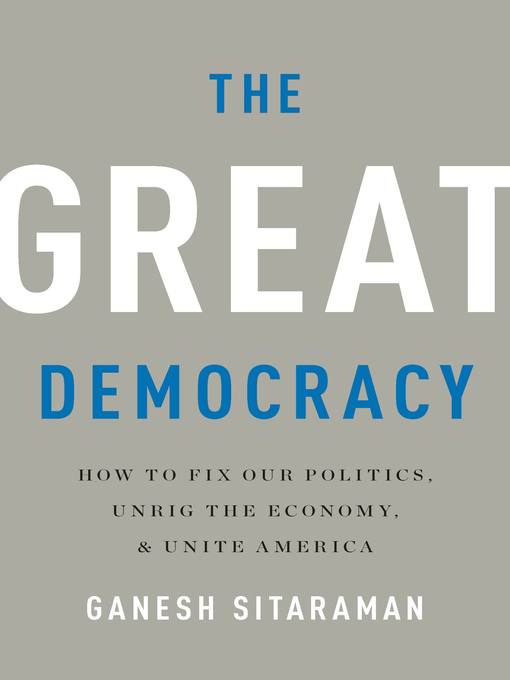
The Great Democracy
How to Fix Our Politics, Unrig the Economy, and Unite America
کتاب های مرتبط
- اطلاعات
- نقد و بررسی
- دیدگاه کاربران
نقد و بررسی

October 1, 2019
A multipronged plan to transform the United States into a compassionate democracy grounded in economic equality among individuals. Sitaraman (Director, Law and Government/Vanderbilt Univ.; The Crisis of the Middle-Class Constitution: Why Economic Inequality Threatens Our Republic, 2017, etc.) believes that U.S. history is cyclical and that the time is ripe for a major transformation, in the manner of abolition or the New Deal. The most significant policies within the author's grand plan would rescue the deteriorating climate before it destroys the planet, balance discriminatory immigration quotas, inject true justice into law enforcement, require national service as a path to unify antagonistic population sectors, and promote responsible journalism both locally and nationally. Some of Sitaraman's less detailed proposals include effective universal health insurance for U.S. residents and the reduced influence of private-sector corporate behemoths. The author believes that citizen participation in what he terms "the great democracy" would increase vastly through legislation and regulations removing barriers based on geography, race, and access to cultural opportunities. Sitaraman also addresses the possibility that his great democracy might not evolve. Undesirable alternatives include a slightly altered version of what he terms "neoliberalism," which would solidify economic inequality among individuals based on market-driven capitalism; "nationalist populism," a way of thinking that led to the rise of Donald Trump; or outright authoritarianism, akin to dictatorship and in ascendancy in numerous nations around the world. Despite cataloging outcomes that he finds alarming, Sitaraman projects hope that the next historical cycle will affirm his agenda. How a reader will react to this monograph will depend heavily on that reader's inclination to see drinking glasses as half full or half empty. "Optimists hope that generational and demographic change will restore inexorable progress," writes the author. "Pessimists interpret the current moment as the decline and fall of democracy." A knowledgeable appraisal of our current moment featuring sensible options for moving forward--but will policymakers take notice?
COPYRIGHT(2019) Kirkus Reviews, ALL RIGHTS RESERVED.

October 28, 2019
Vanderbilt Law School professor Sitaraman (The Crisis of the Middle-Class Constitution) delivers a thoughtful, forward-thinking study of the state of American democracy. He argues that the four pillars of neoliberalism (global trade, industry deregulation, privatization of public services, and budget austerity) have created levels of economic inequality that pose a mortal threat to the country. Without systematic reform, Sitaraman argues, America will become a “nationalist oligarchy” in which a small group of elites controls the government and the economy by means of unlimited political spending, gerrymandering, voting restrictions, and media manipulation. To avoid this outcome, Sitaraman urges the forging of a new sense of American community, the dismantling of excessive corporate power, and the increased participation of “ordinary people” in the political system. He suggests a dizzying number of policies to further these goals, including the merging of the Peace Corps, AmeriCorps, and VISTA into one national service program, the aggressive application of antitrust laws, and such “radical” changes to the Supreme Court as the appointment of all federal appeals judges to the court as associate justices. Sitaraman’s clear prose and willingness to tackle thorny problems are admirable, even if some of his proposals seem farfetched. Progressives will savor this idealistic blueprint for the future.

























دیدگاه کاربران